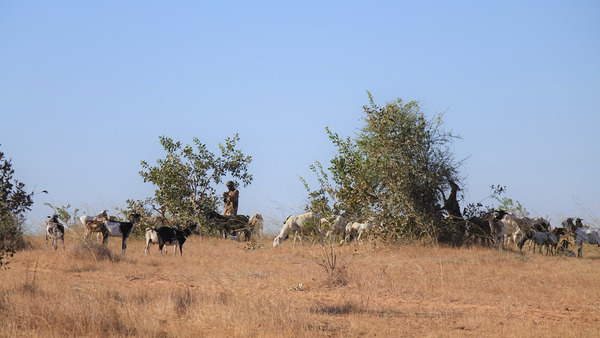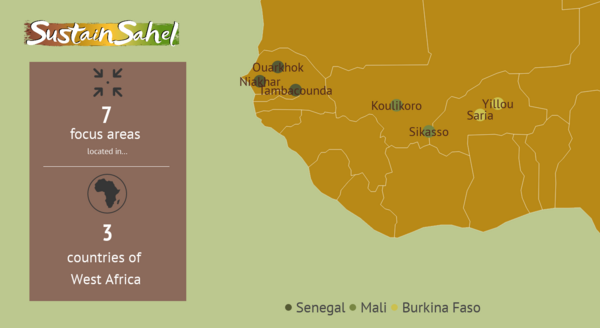The overall goal of SustainSahel is to promote practices that enhance soil quality and yields, build resilience towards climate change, and contribute to food security and better livelihoods. Actions and research to achieve these goals are taking place in the three West African countries, Senegal,Mali and Burkina Faso. It is a major goal of the 18 project partners of SustainSahel to build capacities of the local stakeholders in the seven focus areas. We paid attention to select focus areas that could be relevant across the Sahel region (from west to east Africa) in terms of precipitation, farming systems and ecology.
In each focus area Innovation Platforms (IPs) will be formed with the local stakeholders and maintained to develop into a structural nucleus of the created living labs. This approach is a systematic and integrative process of dialogues among the stakeholders and the interactions between the producers with the project researchers in developing systems of crops integrated with shrubs and livestock (CSL).
What actions has the project taken so far?
Since the project launch in September 2020, Work Package 2 participants have planned and conducted the Participatory Rural Appraisals (PRA) to get an overview of key features for each focus area and identified the most relevant stakeholders related to the key value chains. In parallel, they started surveys to capturing and mapping the main biophysical, social, cultural and historical data and the existing CSL practices in particular. This valuable information will stimulate the IPs in the focus area, will help to direct their minds to CSL systems and to cover the various value chains.
What is coming next?
In each of the seven focus areas, SustainSahel partners are present to coordinate the operations and assure the information flow in a transdisciplinary way. The goal is to ensure farmers and other stakeholders in the value chain build capacities and appropriate ownership of ideas and realities. The personnel send to the focus areas is coming from the leading national federations with locally active farmer organizations on the ground. They are carefully selected and will be trained to facilitate the IPs, support multi-stakeholder interaction and provide relevant background information. The IPs, concentrating on CSL systems, will develop and will be actively maintained over the project lifetime. They will be integrated into similar local interactive fora, if they exist already.
Majority of the research and demonstration activities will be done on farmers’ fields with direct involvement of the communities. Field selection based on the PRA results and consultation with the local villagers are ongoing and will be finalized before the start of the cropping season in June.
Workshops will be organized around ongoing experiments and trials with farmers and representatives of producer organizations, agricultural extension, trade, research, processing sector and traditional and religious leaders. These workshops allow to identify and discuss constraints for the implementation of CSL, potential improvements of techniques and farming systems, reflections and improvement on the IP itself, the role they wish or do not wish to play, activities they would like to conduct and corresponding needs for future trainings.




 tap and then scroll down to the Add to Home Screen command.
tap and then scroll down to the Add to Home Screen command.